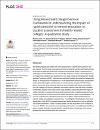Using Assessment Design Decision Framework in understanding the impact of rapid transition to remote education on student assessment in health-related colleges: A qualitative study.
| Author | Jaam, Myriam |
| Author | Nazar, Zachariah |
| Author | Rainkie, Daniel C |
| Author | Hassan, Diana Alsayed |
| Author | Hussain, Farhat Naz |
| Author | Kassab, Salah Eldin |
| Author | Agouni, Abdelali |
| Available date | 2021-07-11T10:06:09Z |
| Publication Date | 2021-07-09 |
| Publication Name | PLoS ONE |
| Identifier | http://dx.doi.org/10.1371/journal.pone.0254444 |
| Citation | Jaam M, Nazar Z, Rainkie DC, Hassan DA, Hussain FN, Kassab SE, et al. (2021) Using Assessment Design Decision Framework in understanding the impact of rapid transition to remote education on student assessment in healthrelated colleges: A qualitative study. PLoS ONE 16(7): e0254444. https://doi.org/10.1371/journal. pone.0254444 |
| Abstract | Maintaining integrity and validity with online assessment is a significant issue that is well documented. Overt policies encouraging educators to adopt e-Learning and implement digital services coupled with the dramatic change in the education system in response to the challenges posed by COVID-19, has furthered the demand for evidence-based approaches for the planning and delivery of assessments. This study employed the Assessment Design Decision Framework (ADDF), a theoretical model that considers key aspects of assessment design, to retrospectively investigate from a multi-stakeholder perspective the assessments implemented following the rapid transition to remote learning during the COVID-19 pandemic. One-to-one semi-structured interviews were conducted with faculty and students from the Colleges of Pharmacy, Medicine and Health Sciences. After inductive and deductive thematic analysis three major themes were identified. These reflected on the impact of sudden transition on assessment design and assessment plan; changing assessment environment; and faculty-student assessment related interactions which included feedback. The use of a comprehensive validated framework such as ADDF, to plan assessments can improve validity and credibility of assessments. The strengths of this study lie in the innovative adoption of the ADDF to evaluate assessment design decisions from both an educator and student perspective. Further, the data yielded from this study offers novel validation of the use of ADDF in circumstances necessitating rapid transition, and additionally identifies a need for greater emphasis to be attributed to the significance of timeliness of the various activities that are advocated within the framework. |
| Language | en |
| Publisher | Public Library of Science |
| Subject | Rapid transition Higher education Student Assessment Framework Online |
| Type | Article |
| Issue Number | 7 |
| Volume Number | 16 |
| ESSN | 1932-6203 |
Files in this item
This item appears in the following Collection(s)
-
Pharmacy Research [1426 items ]


